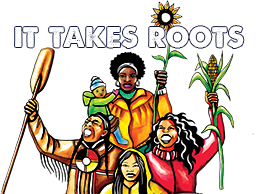Elizabeth C Yeampierre
When things are bad for everyone, they are particularly bad for people of color. The Trump administration is about to legitimize injustice in all of our communities. People of color have endured the extraction of our land and labor – and its legacy – since the creation of these United States. Now, we are bracing ourselves for worse things to come.
The environmental and climate justice movement has had substantial successes on both the local and national fronts. We have cleaned up brownfields, stopped the siting of power plants, facilitated community-based planning for climate adaption and resilience, all while developing a framework known as Just Transitions, which rejects the “dig, burn, dump” economy and wants to push it away from an extractive economy to a regenerative one.
Always frontline-led and solutions–oriented, we have been working diligently to operationalize this transition through such initiatives as community-owned solar, offshore wind and local cooperatives that model another way to live without a carbon footprint. Energized by the momentum created by the People’s Climate March and the breadth of knowledge shared by the Climate Justice Alliance’s Our Power Campaign, the last few years have been all about the possibilities.
And then Trump was elected.
The solutions to unresolved environmental justice crises in low-income communities of color that the environmental and climate justice movement and allies have been diligently working to resolve now suddenly appear unattainable.
Over a year ago, Obama declared a state of emergency in Flint, Michigan. While it is vanished from the daily news cycle, very little has changed for the residents of Flint, Michigan. The capital to replace the water service lines has not been secured, and they are still relying on bottled water indefinitely. What is the future of this community under the Trump administration?
The federal Interagency Working Group on Environmental Justice had a modest success in the area of environmental health. However, there was at least a commitment built into the institutions to addressing the needs of communities disparately impacted by environmental burdens.
This commitment provided our communities federal resources to educate and remediate problems locally. Those federal resources will no longer exist. And foundation dollars will start being offered to large organizations to address the needs of the frontline, displacing the local leadership of the grassroots.
The Gulf South is experiencing 1,000-year storms on a regular basis. South Florida experiences floods from sea level rise absent any storm activity. And in Brooklyn, New York, despite Superstorm Sandy, municipal leadership is so beholden to real estate interests that they disregard opportunities to operationalize Just Transitions that will address the region’s climate needs.
This market-driven real estate perspective, now extending from City Hall to the Oval Office, puts our communities in harm’s way of unmitigated climate disruption.
At the center of all this is Standing Rock and Black Lives Matter, symbols and anchors of intersectionality and community power. Environmental and climate justice have always operated at that intersection of racial, social, gender and economic justice.
Our communities across the nation have struggled but survived with administrations that moved slowly. We have never faced an administration that on all underlying tenets of climate justice – including the very existence of climate change – is at best indifferent and at worst actively antagonistic.
The appointments of climate denier Scott Pruitt as head of the Environmental Protection Agency, fossil fuel-backed Ryan Zinke as head of Department of Interior, ExxonMobil CEO Rex Tillerson as secretary of state, neo-Confederate Jeff Sessions as attorney general and fast food executive Andrew Puzder as secretary of labor all constitute direct attacks on these tenets and communities of color.
As we face a full-scale assault on our very existence, we are planning, organizing, building, educating and resisting with an understanding of what this means for our communities.
